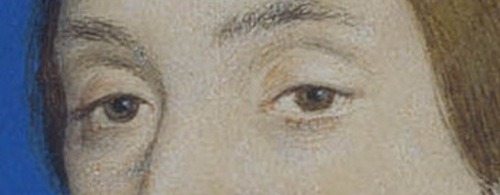
Katheryn Howard was doomed, and it seems she knew it.
As with much of the Tudor era, Eustace Chapuys, the Imperial ambassador, is the greatest source of information. Unlike Anne Boleyn, Chapuys didn't dislike Katheryn. She was old-school Catholic and hadn't made political waves. He was mostly indifferent to her, but as always, he reported the gossip which came his way, some of it inaccurate.
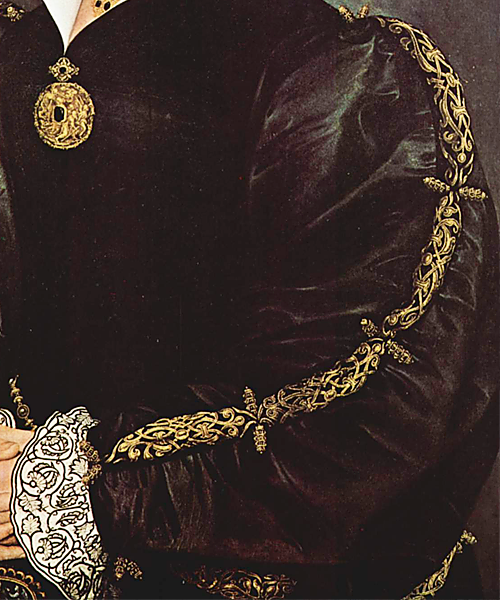 Katheryn was imprisoned in the old nunnery of Syon Abbey after the king learned of her pre-marital sexual experience and the fact she'd been meeting Thomas Culpepper in secret. The king gave orders that she was to be lodged "moderately" with "mean stuff" with no cloth of estate furnishing her chambers. She had been stripped of her title, so she was now a mere gentlewoman. She was given six dresses, and the orders were that none were to have jewels sewn to the fabric, though gold trim was permitted.
Katheryn was imprisoned in the old nunnery of Syon Abbey after the king learned of her pre-marital sexual experience and the fact she'd been meeting Thomas Culpepper in secret. The king gave orders that she was to be lodged "moderately" with "mean stuff" with no cloth of estate furnishing her chambers. She had been stripped of her title, so she was now a mere gentlewoman. She was given six dresses, and the orders were that none were to have jewels sewn to the fabric, though gold trim was permitted.Katheryn, who had gone from genteel poverty to a palace, now lived in three rooms. She'd had a queenly retinue of at least thirty ladies (the standard number) but now was allowed only four women to serve her. She had been allowed to choose them - a kindness not extended to Anne Boleyn - so Katheryn at least had friendly faces around her in her darkest days.
Though her residence was likely comfortable, it was still a prison. She had no visitors other than the council members who occasionally questioned her, no letters from friends with words of comfort. Katheryn waited there to find out what the king intended to do with her.
 On the first of December, 1541 the indictment was introduced:
On the first of December, 1541 the indictment was introduced:That Katharine, queen of England, formerly called Kath. Howerd, late of Lambyth, Surr., one of the daughters of lord Edmund Howard, before the marriage between the King and her, led an abominable, base, carnal, voluptuous, and vicious life, like a common harlot, with divers persons, as with Francis Derham of Lambeth and Hen. Manak of Streteham, Surr., 20 and 24 May 32 Hen. VIII., and at other times, maintaining however the outward appearance of chastity and honesty. That she led the King by word and gesture to love her and (he believing her to be pure and chaste and free from other matrimonial yoke) arrogantly coupled herself with him in marriage.
And the said Queen and Francis, being charged by divers of the King’s Council with their vicious life, could not deny it, but excused themselves by alleging that they were contracted to each other before the marriage with the King; which contract at the time of the marriage they falsely and traitorously concealed from the King, to the peril of the King and of his children to be begotten by her and the damage of the whole realm.
And after the marriage, the said Queen and Francis, intending to renew their vicious life, 25 Aug. 33 Hen. VIII., at Pomfret, and at other times and places, practised that the said Francis should be retained in the Queen’s service; and the Queen, at Pomfret, 27 Aug. 33 Hen. VIII., did so retain the said Francis, and had him in notable favour above others, and, in her secret chamber and other suspect places, spoke with him and committed secret affairs to him both by word and writing, and for the fulfilling of their wicked and traitorous purpose, gave him divers gifts and sums of money on the 27 Aug. and at other times.
Also the said Queen, not satisfied with her vicious life aforesaid, on the 29 Aug. 33 Hen. VIII., at Pomfret, and at other times and places before and after, with Thos. Culpeper, late of London, one of the gentlemen of the King’s privy chamber, falsely and traitorously held illicit meeting and conference to incite the said Culpeper to have carnal intercourse with her; and insinuated to him that she loved him above the King and all others. Similarly the said Culpeper incited the Queen. And the better and more secretly to pursue their carnal life they retained Jane lady Rochford, late wife of Sir Geo. Boleyn late lord Rochford, as a go-between to contrive meetings in the Queen’s stole chamber and other suspect places; and so the said Jane falsely and traitorously aided and abetted them.
The same day as the indictment, Culpepper and Dereham were given a perfunctory trial for treason at the Guildhall and found guilty.
The French ambassador wrote that he found it a little curious:
The personages before named were, five or six days ago, brought from the Tower into the great consistory of London, called Illehale (Guildhall), where the Mayor first, and beside him the Chancellor, Norfolk, Suffolk, and the rest of the Council, in presence of all who chose to attend, made anew the process of the said prisoners, and read aloud the Queen’s signed deposition of what she had done with Durans before marriage, and her conversations with Colpepre.
After both had been heard and examined they were condemned, Durans for having not only kept the lady from the time he violated her at the age of 13 until 18, but for having since been of her chamber and brought thither the woman who had been his accomplice before, which is presumptive evidence that they continued in their first purpose, especially as the Queen had said to lady Rochefort that if Colpepre would not listen to her there was, behind the door, another “qui ne demandoit pas meilleur party.”Colpepre had like sentence, although he had not passed beyond words; for he confessed his intention to do so, and his confessed conversations, being held by a subject to a Queen, deserved death.
Many people thought the publication of these foul details strange, but the intention is to prevent it being said afterwards that they were unjustly condemned. Another strange thing has been noted, viz., that Norfolk was at the judgment, and even in examining the prisoners laughed as if he had cause to rejoice.
Francis Dereham's only crime had been to sleep with an unmarried girl long before she came to court. He and Thomas Culpepper, who had met with the queen to exchange whispers and gifts, were executed at Tyburn nine days later.
The king had once liked Thomas Culpepper, and so he extended to him the merciful death of a quick beheading. Dereham was not so fortunate. He had been the one to pluck Henry's "rose without a thorn" and the king decreed:
As to the remission of the extremity of Deram's judgment [sentence], the King thinks he has deserved no such mercy.
Dereham suffered the full horrors of a traitor's death - a protracted, painful, and gory experience. The heads of both men were impaled on spikes on London Bridge as a warning to others.
Katheryn was probably told of the trial and execution of these men, and it probably cemented in her own mind that she would be executed as well. She remembered what had happened to her cousin.
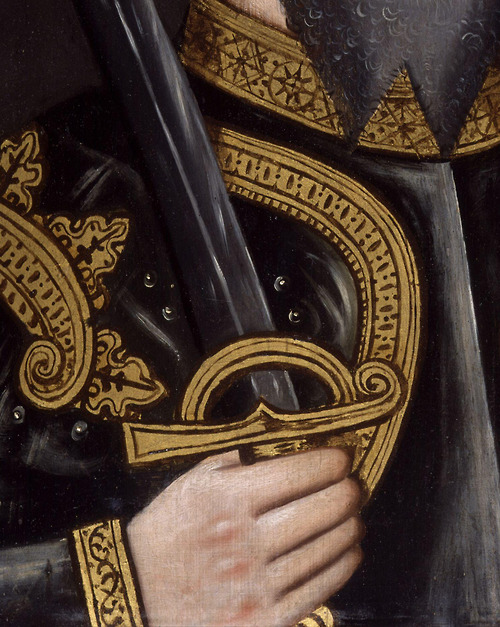 There's a story - likely apocryphal - that Katheryn was offered clemency if she would admit to being Dereham's wife, but she refused. Anne Boleyn had agreed to annul her marriage to the king. She may have believed - or was promised - she would to be sent to a nunnery instead of executed. But a few days later, she was led to the scaffold.
There's a story - likely apocryphal - that Katheryn was offered clemency if she would admit to being Dereham's wife, but she refused. Anne Boleyn had agreed to annul her marriage to the king. She may have believed - or was promised - she would to be sent to a nunnery instead of executed. But a few days later, she was led to the scaffold.Likely, such an offer was never made to Katheryn. The king didn't feel he needed an annulment on top of an execution this time.
At the end of January, Chapus wrote about Katheryn's condemnation:
A few days ago the assembly of Parliament, or the States of this kingdom, began its sessions. The chief point of the Chancellor's speech relates to the Queen's misdeeds, which that official exaggerated and aggravated without measure.
After some four days' discussion, the members, lords, and prelates sitting in the said Parliament have declared the Queen, as well as Mme. de Rochefort [Jane Parker, Lady Rochford], guilty of high treason and lese Majesty.
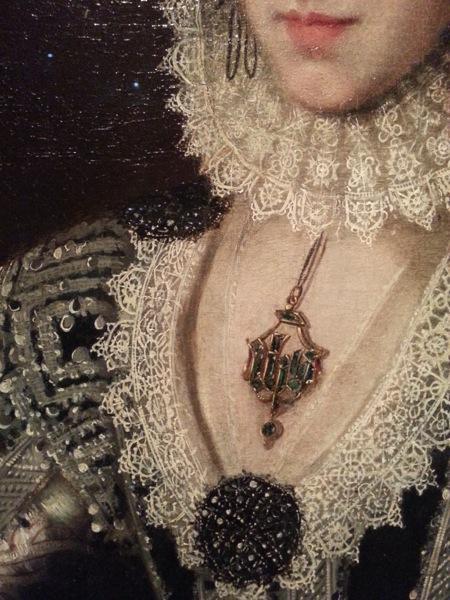 The security at Katheryn's prison was increased, which he took to be a dire sign of things to come. Chapuys seems to have believed that Katheryn was living it up during her imprisonment. However, he had a few facts wrong:
The security at Katheryn's prison was increased, which he took to be a dire sign of things to come. Chapuys seems to have believed that Katheryn was living it up during her imprisonment. However, he had a few facts wrong:At this very moment, whilst I am writing these lines, some one comes to tell me that this very morning the Commons have passed a similar resolution on the Queens, Mme. de Rochefort's, and the two other ladies' cases. It is, therefore, to be apprehended that the Queen will be soon taken to the Tower.
She is still in Sion House, making good cheer, fatter and handsomer than ever she was, taking great care of her person, well dressed, and much adorned [with jewels]; more imperious and commanding, and more difficult to please than she ever was when living with the King, her husband. Notwithstanding this, she believes that her end will be on the scaffold, for she owns that she has deserved death. Her only prayer is that the execution be secret, and not in public.
Chapuys was wrong about the jewels - they had been confiscated the day of Katheryn's arrest - and incorrect as well about her access to clothing. She may have indeed been plumper due to stress and inactivity, but from other descriptions of Katheryn's hysteria and weeping, it's difficult to imagine she was, indeed, "making good cheer" during her imprisonment.Perhaps, unless the King wishes to marry again, for which at present he shows no inclination, he may evince some commiseration towards her; perhaps, also, he may find it easy and allowable for himself to have several wives, and afterwards get rid of them by cause of adultery or in some other way, and in that case his late queen's life might be spared.
The wait must have seemed endless to Katheryn, imprisoned in those three small rooms with only her friends for comfort. No mention is made of whether books were supplied to her. One would think she would have been allowed a Bible or other devotional works, but there isn't any record of it. What did she do to pass time time as the days became weeks, and the weeks became months?
Unlike Anne Boleyn, no order was given to record Katheryn's words and movements during her imprisonment, so we do not know. All we have are those glimpses in the letters of the ambassadors.
Chapuys's musings about the king's next marriage was what was on everyone's mind. Poor Katheryn was mostly an afterthought in the letters and dispatches. Everyone was wondering who would replace her. Many believed Anna von Kleefes would re-take her place as Henry's wife. Anna, smart lady that she was, pretended to be enthusiastic about the idea.
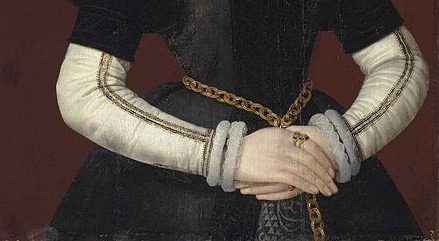 Chapuys mentioned it on December 3rd.
Chapuys mentioned it on December 3rd.It was thought that the King, who has gone sporting in the neighbourhood of this city to relieve his mind, would perhaps have gone in the direction where the lady of Cleves is, but he has taken another road, and there is no sign, as yet, of his taking her back. As Chapuys is intimate with the clerk of the Council above referred to he ventured to suggest that if the King separated from this Queen on account of her having had connection with another man before she married him, he might well have abandoned the lady of Cleves for the same cause, according to the rumour au pays de par de la; and that was not difficult to believe at her age, considering “qu'elle patrisoit (practiquoit?) ung peu en cas de vin et autres condicions,” as was sufficiently evident. This the clerk did not deny, but said he did not believe the King would take her back or marry another woman unless Parliament forced him.
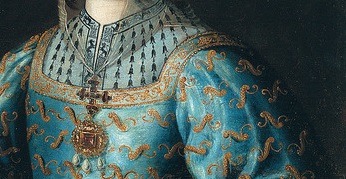
The following day, a commoner was brought before the magistrates for saying much the same thing. (Which goes to show how pervasive court gossip was among the people.)
Jane Rattsey, examined of her words to Eliz. Bassett, viz.: “What if God worketh this work to make the lady Anne of Cleves queen again?” says it was an idle saying suggested by Bassett's praising the lady Anne and dispraising the Queen that now is. Never spoke at any other time of the lady Anne, and she thinks the King's divorce from her good. Examined why she said, “What a man is the King! How many wives will he have?” She said it upon the sudden tidings declared to her by Bassett, when she was sorry for the change and knew not so much as she knows now.
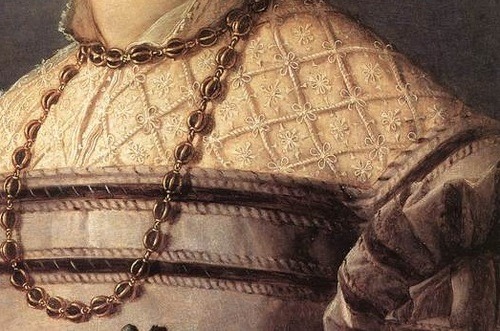 Others were watching the ladies the king dined with in the evenings for any sign of interest. Thomas Wyatt's wife was one of the prospects mentioned - Wyatt had been granted some property and offices that had been seized from the doomed Culpepper.
Others were watching the ladies the king dined with in the evenings for any sign of interest. Thomas Wyatt's wife was one of the prospects mentioned - Wyatt had been granted some property and offices that had been seized from the doomed Culpepper.The lady for whom he showed the greatest regard was the sister of lord Cobham, whom Wyatt sometime ago repudiated for adultery. She is a pretty young creature, with wit enough to do as badly as the others if she were to try.
Katheryn and Lady Rochford were attained (convicted) in January.
Attainder of Katharine Howard and others.—Katharine Howard whom the King took to wife is proved to have been not of pure and honest living before her marriage, and the fact that she has since taken to her service one Francis Dereham, the person with whom she "used that vicious life before," and has taken as chamberer a woman who was privy to her naughty life before, is proof of her will to return to her old abominable life. Also she has confederated with lady Jane Rocheford, widow, late wife of Sir Geo. Boleyn, late lord Rocheford, to "bring her vicious and abominable purpose to pass" with Thos. Culpeper, late one of the King's Privy Chamber, and has met Culpeper in "a secret and vile place," at 11 o'clock at night, and remained there with him until 3 a.m., with only "that bawd, the lady Jane Rocheford."
For these treasons, Culpeper and Dereham have been convicted and executed, and the Queen and lady Rochford stand indicted. The indictments of such as have lately suffered are hereby approved, and the said Queen and lady Rochford are, by authority of this Parliament, convicted and attainted of high treason, and shall suffer accordingly; and the said Queen, lady Rocheford, Culpeper, and Dereham shall forfeit to the Crown all possessions which they held on 25 Aug. 33 Hen. VIII.
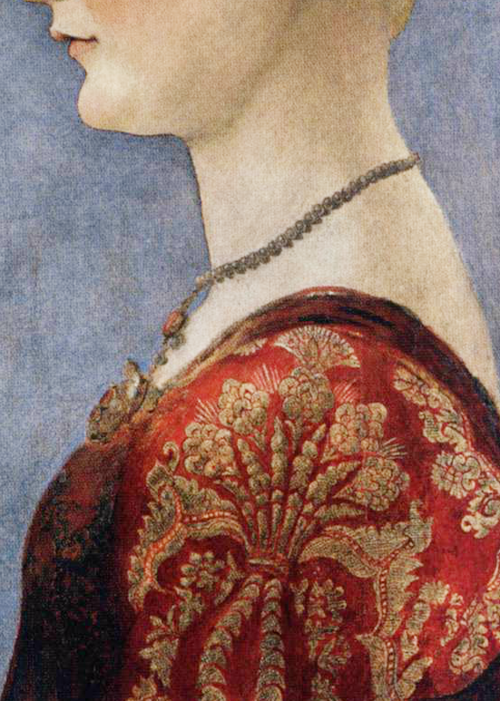
But even as late as February 9, Chapuys was reporting that Katheryn's ultimate fate was unknown.
The Comptroller is then to take the Queen to his own lodging, that is to say, to the Tower, of which he is governor. No final determination has yet been come to about her fate, but in two or three days it will be known.
Indeed ... it would.



No comments:
Post a Comment